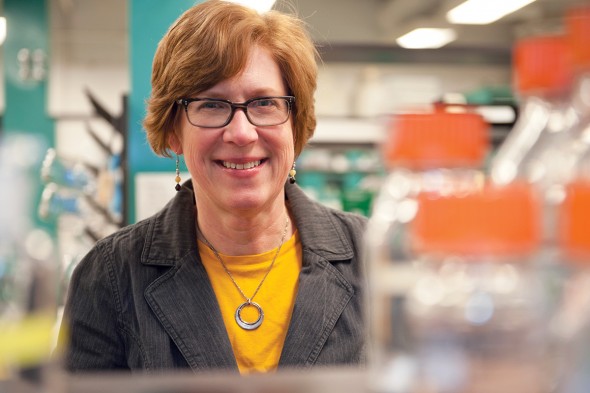Leading women to success in science

Biological sciences professor Mary Ashley helped create a diversity training program for search committees. “Scientists think they are objective, so as a group, they think they’re not susceptible to biases — but biases exist everywhere,” she says. Photo: Roberta Dupuis-Devlin
When Mary Ashley was in graduate school, she didn’t have female mentors. In fact, she was the first female graduate student in ecology and evolution at the University of California, San Diego.
“There was just one female faculty member and she was so busy — she had two kids and was trying to get tenure,” said Ashley, professor of biological sciences. “She was way too busy to talk to me.”
Now a professor herself, Ashley also has a lot on her plate. But one of the highlights of her 20-year career at UIC has been mentoring graduate students, about 60 percent of them women.
“I’ve had the opportunity to work with really good graduate students,” she said. “I’ve always given my graduate students a lot of free rein to develop their own projects.
“Mentoring them is something that’s been the stable constant, continuous the whole time I’ve been here.”
Ashley, named this year’s UIC Woman of the Year by the Chancellor’s Committee on the Status of Women, will be honored at a reception from 11:30 a.m. to 1:30 p.m. Thursday in the Michele M. Thompson Rooms A and B, Student Center West.
Her involvement with graduate students doesn’t stop at mentoring. Through a National Science Foundation grant, she developed an interdisciplinary graduate program in urban ecology that has supported 22 students.
The program, called Landscape, Ecological and Anthropogenic Processes, trains students for careers that promote biodiversity in urban areas.
“It’s not just about natural science — the students all had a social science component to their research and did things like surveys, network analysis and citizen science, getting people involved in research,” she said. “It’s very exciting and rewarding.”
In her lab, Ashley conducts genetic studies on plants and animals, specifically on mating systems and population structure.
“We’re using genetics to figure out who’s mating with whom in nature,” Ashley said. “We’re looking at trees in your backyard: who are its mates — are they trees in the neighborhood or trees miles away?”
Many of her studies include paternity testing. She even conducted paternity studies to identify the fathers of the chimpanzees Jane Goodall studied at Gombe.
With Goodall, she co-authored a paper about the mating system of the chimpanzees.
“They had never been able to tell who the dads were because chimpanzees are very promiscuous,” she said. “We did genetic testing to determine who the fathers were over a 30- to 40-year period.”
Ashley was a facilitator for the Women in Science and Engineering System Transformation (WISEST) program for five years, helping to encourage women in tenure-track positions in science, technology, engineering and mathematics. In her role, she talked with female faculty members in the STEM disciplines about the work climate at UIC, trying to find ways to promote their career development.
“It was a good fit for my interests and felt like you were getting something done,” she said.
A key problem for Ashley was convincing fellow biologists that there was a gender-related problem to be solved. About 60 percent of students in biological sciences are women — but only 20 to 30 percent of faculty members are female.
“In terms of female faculty, we’re much better off than some departments, but with the loss of women between either undergraduate and Ph.D. studies and a tenure-track faculty position, the pipeline in biology is much worse than in some disciplines,” Ashley said.
A highlight of the WISEST program was the development of a diversity training program for search committees, Ashley said.
“Scientists think they are objective, so as a group, they think they’re not susceptible to biases — but biases exist everywhere,” she said.
Ashley knows it can be difficult for female faculty members to juggle career and family. When she was working toward a tenured position, she had two young daughters.
“I sometimes think of my 30s as just a blur — writing grants, having babies, doing research,” she said.
“That was pretty much it. It was quite a balancing act.”
Ashley’s daughters are grown now — Sara, 22, recently graduated with an art degree from Illinois State University and Marta, 19, is studying theater at Northern Illinois University.
Ashley, who lives in the Andersonville neighborhood, enjoys spending her free time cooking, playing piano and competing as a power forward in a women’s basketball league.
“I love basketball — I played in college and still play competitively,” she said.
“I feel like now that my kids are older, I’ve been able to spend more time doing some different things.”
